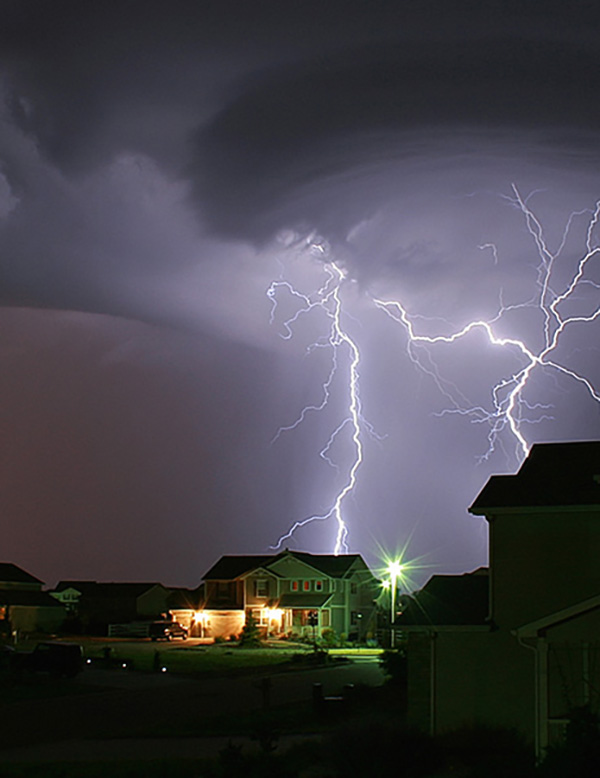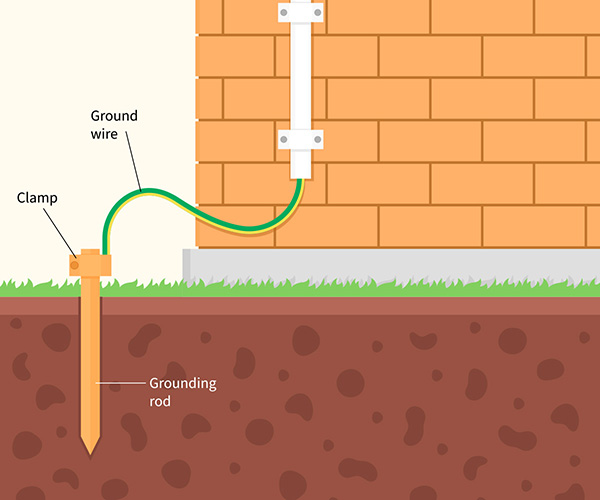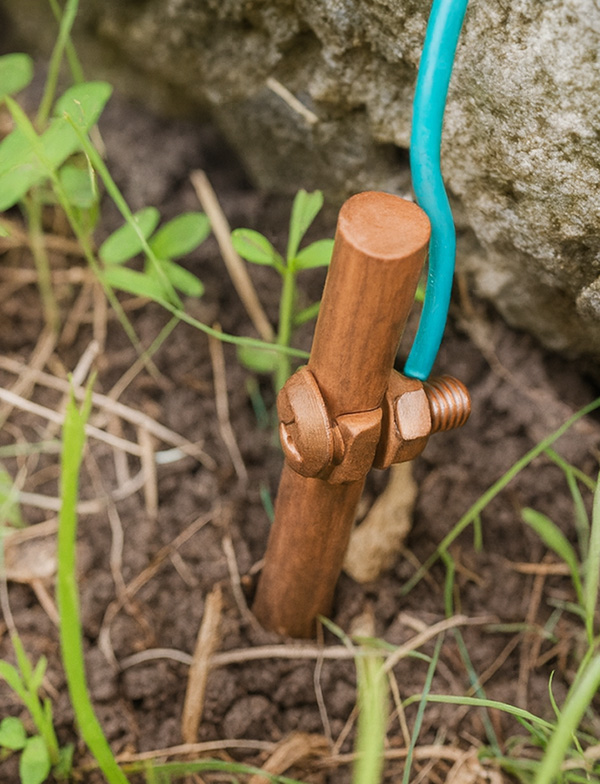What Is Electrical Grounding?
Every modern home electrical system includes a grounding component that connects the wiring to the earth, typically through a copper or galvanized steel rod driven into the ground. This connection ensures that if a fault occurs—such as a short circuit, lightning strike, or power surge—the excess current safely flows away from your home’s wiring and into the ground.
In simple terms, grounding acts as a safety valve. It gives stray electrical energy a direct route out of your home, preventing dangerous buildup that could lead to electric shocks, fires, or damaged electronics.
Warning Signs Your Home May Not Be Properly Grounded
Grounding problems aren’t always obvious, but there are telltale signs that your home may not be safely grounded. You may need a professional inspection if you notice:

Frequent Power Surges or Flickering Lights
If your lights dim, flicker, or you notice frequent power surges, it could signal that excess electricity is not being safely directed to the ground. Surges can damage sensitive electronics and appliances, and consistent flickering may indicate a grounding issue or other wiring problem that needs attention.
Shocks or Tingling Sensations
Feeling a mild shock or tingling sensation when touching metal appliances, light switches, or plumbing fixtures is a serious red flag. Proper grounding prevents electricity from traveling through metal surfaces that people may come into contact with. If you experience shocks, it’s crucial to have your system inspected immediately.
Buzzing Sounds from Outlets or Fixtures
A low buzzing or humming noise from outlets, switches, or light fixtures may suggest a grounding or wiring problem. Buzzing often occurs when electricity is struggling to find a safe path to the ground, which could potentially lead to overheating or even fire hazards.
Sparking or Discoloration Around Outlets or Breaker Panels
Any visible sparks or burn marks on outlets, switches, or your electrical panel are clear indicators of electrical stress or improper grounding. This can signal loose connections or faulty wiring that must be corrected to prevent shocks or fire.
Two-Prong Outlets Instead of Three-Prong
Older homes may still have two-prong outlets, which lack the proper grounding connection. Three-prong outlets include a ground wire to protect appliances and people. If your home has two-prong outlets, it may be time to update your wiring and ensure proper grounding throughout your electrical system.
Tripped Breakers or Blown Fuses Without a Clear Cause
If breakers trip or fuses blow without an obvious reason, your electrical system may not be safely diverting excess current to the ground. While this can sometimes be caused by overloaded circuits, repeated unexplained trips often indicate grounding or wiring issues that need professional attention.
Why Grounding Matters for Home Safety
A properly grounded electrical system helps protect every part of your home, including:
People you love
Prevents electrical shock by providing a safe route for unwanted current.Appliances
Shields sensitive electronics, kitchen appliances, and HVAC systems from damage caused by surges or wiring faults.Your Home’s Wiring
Helps your breakers and fuses function correctly by allowing excess current to flow away safely.

How Proper Grounding Is Established

When grounding issues are found, our team can correct them using proven, code-compliant methods. Depending on your home’s design and soil conditions, grounding may include:
- Installing new ground rods or plates at the proper depth and spacing for maximum conductivity.
- Connecting the grounding system to your main service panel with a properly sized copper grounding conductor.
- Bonding metal components (like water pipes or gas lines) to the grounding system to ensure the entire home is protected.
- Upgrading outdated wiring or replacing corroded connections to restore proper continuity and safety
These improvements help your home handle electrical faults safely, ensuring that dangerous currents go exactly where they’re supposed to—into the ground, not through your electrical system or your family.
How Grounding is Tested
At Electrical Solutions of Central Arkansas, our licensed electricians use specialized diagnostic equipment to verify your home’s grounding system. Testing typically includes:
Visual Inspection: Checking the main service panel, grounding electrodes, and bonding connections to ensure everything is securely attached and corrosion-free.
Continuity Testing: Using meters to confirm that grounding conductors are properly connected throughout your system.
Earth Resistance Testing: Measuring the resistance between your grounding system and the earth to make sure it meets code requirements and provides an effective safety path.
Our electricians record these readings and compare them to National Electrical Code (NEC) standards. If grounding resistance is too high or connections are weak, we’ll pinpoint the issue and recommend the right corrective action.

Professional Grounding Inspection and Correction
At Electrical Solutions of Central Arkansas, we take grounding seriously. Our certified electricians use advanced testing equipment to evaluate your home’s electrical system and verify compliance with current safety codes. If any problems are found, we’ll correct them quickly and effectively—whether that means replacing old wiring, adding a new grounding electrode, upgrading your electrical panel, or testing to ensure excess voltage is being directed to the earth.
Keep your home, your loved ones, and your electronics safe with a professional grounding inspection. Contact Electrical Solutions of Central Arkansas today or call us at (501) 414-9402 to schedule service or learn more about our residential electrical safety solutions.
Protect Your Home with Whole House Surge Protection
Even a well-grounded home can face sudden voltage spikes from lightning strikes, utility issues, or large appliances cycling on and off. A Whole House Surge Protector adds an extra layer of defense, shielding every outlet, appliance, and electronic device from damaging surges. It’s a smart investment that works hand-in-hand with proper grounding to keep your home’s electrical system safe and stable.

What Are the Benefits of Grounding Your Home?
Protects People from Electrical Shock
Proper grounding provides a safe path for stray electricity to flow into the earth, reducing the risk of electrical shock when touching appliances, fixtures, or metal surfaces in your home.
Stabilizes Voltage Levels
A grounded electrical system ensures consistent voltage throughout your home, preventing fluctuations that can shorten the lifespan of your electronics and appliances.
Safeguards Appliances and Electronics
Grounding helps prevent damage from power surges or lightning strikes by diverting excess current away from your sensitive electronics, appliances, and home entertainment systems.
Helps Circuit Breakers and Fuses Work Properly
Grounding allows your breakers and fuses to trip as intended during an overload or fault, protecting both your electrical system and your property.
Reduces Fire Risk
By safely channeling excess electricity away from wiring, proper grounding decreases the likelihood of overheating, sparks, or electrical fires in your home.
Increases Overall Electrical Safety
A properly grounded home meets current electrical codes and standards, giving homeowners peace of mind that their wiring system is secure, efficient, and reliable.







